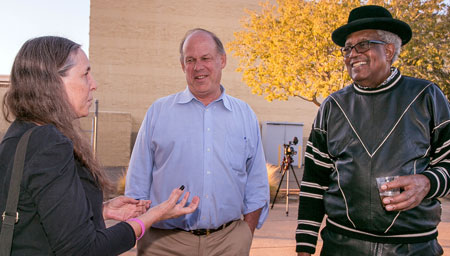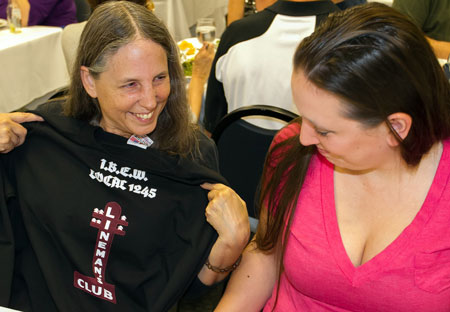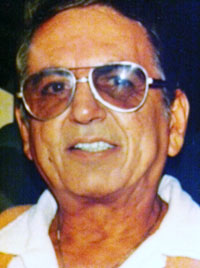Historic neon sign lights up 10th Anniversary Party at Weakley Hall
By Eric Wolfe
Cheers erupted as a flash of neon split the night in Vacaville on Oct. 26 and the Lineman’s Club rose from the ashes of history to start a new career at IBEW 1245.
An Oakland watering hole once popular with PG&E workers, the Lineman’s Club closed its doors many years ago. But its bold neon sign got a new lease on life when its rusting remains were rescued, restored, and relocated to the back entrance of Weakley Hall, IBEW 1245’s Vacaville headquarters.

Michele Fassio, left, and former Business Representative Veodis Stamps, right, share their memories of the old Lineman’s Club with Business Manager Tom Dalzell. Photo by John Storey
The lighting ceremony was the concluding act in a party celebrating the 10th anniversary of Ronald T. Weakley Hall, the union’s bustling headquarters.
“This is a great piece of lineman history,” said Business Manager Tom Dalzell, who spotted the sign hanging darkened and forlorn at an Asian market earlier this year. “We decided it deserved a new home.”
The sign is a pretty good likeness of a utility pole, complete with cross-arm and insulators—all of it outlined in brilliant red, green and blue neon.
Gathering in the union hall’s parking lot for the lighting ceremony were members of the Advisory Council, along with current and former staff and Executive Board members. Throwing the switch for the ceremonial lighting was Michele Fassio, whose father Russ ran the Lineman’s Club when she was growing up in Oakland.
“My dad would be so thrilled,” she said.
“Draft Beer was 50 Cents”
Russ Fassio acquired the Lineman’s Club in 1954—the year Michele was born. As children, Michele and her brother helped their dad with chores at the bar.
“We used to clean the bar on Sunday mornings at 6 a.m. for my dad. We’d sweep the floor, clean the sink, dust the bottles,” she said. “Draft beer was 50 cents and a tall one was 75 cents. Well liquor was a dollar and call liquor was a buck and a half.”
The prices were right for the IBEW 1245 members who came over regularly from the local PG&E yard.
“There would be at least nine or ten of us in the afternoon,” recalled lineman and former IBEW 1245 Business Representative Veodis Stamps. He and his co-workers would get off at 4:30—or maybe a tiny bit earlier, if you want to be completely honest about it—and head to the bar.
“By a quarter to five we’d be there. On Friday nights, we’d stay ’til 2:00 because we didn’t have to work the next day,” said Stamps, who was partial to Singapore Slings.
The Lineman’s Club wasn’t their only watering hole, of course. Back then, it seemed like there was a bar on every block throughout the city, according to Stamps.
“You’d go up Telegraph, there was nothing but bars all the way up Telegraph,” he said.
But the linemen favored the bar whose name and sign celebrated the work they did: the Lineman’s Club. It was the place, Stamps said, that “we’d always gravitate to.”
“Cops, Hells Angels, Everybody”

Michele shows off her new Lineman’s Club tee-shirt to daughter Megan at the party celebrating the 10th anniversary of Weakley Hall and the dedication of the Lineman’s Club sign. Photo by John Storey
Michele Fassio said her brother called it the United Nations.
“There was every kind of person you could imagine, every color, creed, cops, Hells Angels, everybody used to go to that bar. Everybody got along,” Michele said.
More often than not, customers were personally served by Russ himself. He worked most days and came in on Sunday to do the books. He stayed open on Thanksgiving and served dinner to the regulars who didn’t have any place else to go. For them, Michele said, the Lineman’s Club was home.
On other holidays, including Christmas, he invited customers to his house for dinner. On New Year’s, “he would throw a big party for everyone and have prime rib and all kinds of food so people would have a place to go,” she recalled.
When Michele was pregnant, they held the baby shower at—you guessed it—the Lineman’s Club. All the regular patrons were there for the celebration. “They were really part of our family, too,” she said.
Michele’s daughter Megan learned to walk well before she reached her first birthday. This precious feat was first accomplished, of course, at the Lineman’s Club.
Beacon of Fellowship
But the party couldn’t last forever. After a battle with cancer, Russ Fassio died in 1985.
“My brothers and stepmother tried to make it work, but really, the bar was my dad. So we ended up selling it,” Michele said.
The years passed. The Lineman’s Club disappeared, its customers dispersed. An Asian market set up shop in the building. But outside, the Lineman’s Club sign clung to life, barely—a rusting memory of an era when beers were 50 cents, tall ones were 75, where linemen arrived at 4:45 p.m., and regulars could get Thanksgiving dinner if they didn’t have anywhere else to go.
From its new home at IBEW 1245, the Lineman’s Club sign is still a beacon of fellowship, the red arrow still pointing the way inside. You’ll be disappointed if you come looking for Singapore Slings or 50-cent beers, but you may just find something else inside that the Lineman’s Club always represented: a place where working men and women are welcome.
